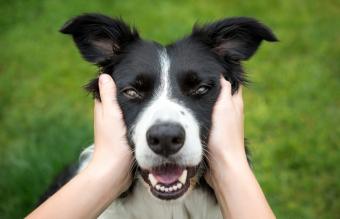
We all know that moment. Your pooch is cuddled next to you and your date, and suddenly you both go, “Oh my gosh, what is that horrid smell?" Hopefully your date is a dog person and will already understand dog farts, but the downright stank can be a bit embarrasing. I mean, dog farts are a natural thing, but definitely not the most pleasant. And, even if it is just us in the house, there are times when it can be cause for concern.
Dogs Naturally Fart

Simply put, dogs fart. And if you have a dog, you've probably already experienced it. I can picture it as I'm writing this. My dog is sitting next to me on the couch as my fiance and I are watching a movie, and all of a sudden we get a whiff of what smells like a skunk who drank rotten garbage juice and walked over and sprayed right next to us. Seriously, it makes you gag! Of course we still love him, but, oh man, those farts are rancid.
And Some Dog Breeds Fart More
Some breeds are notorious for being little fart machines. Most of these are short-nosed breeds like:
We’ll call these breeds "natural farters" because they don’t even need certain foods to make farts. They create gas by gulping air as they eat nearly everything.
You may be able to help reduce your dog's gas by slowing their feeding routine so they gulp less air. Try a food puzzle to make mealtime last longer.
Why Do My Dog's Farts Smell So Bad?
Unfortunately, dog farts are naturally stinky. After all, farts are a food byproduct that comes from your dog’s butt, so it’s not going to be "fantabulous." But sometimes excessive farting or especially bad smells can signal a time to call the veterinarian.
How Dog Farts Are Made
After your dog eats, the bacteria in their intestines start to break the food into nutrients their body can use for various functions. During this process, hydrogen sulfide gas is released as a byproduct, and some foods can cause more of this than others. When that gas gets trapped, it’s released into the air from your dog’s butt in the form of what we call a fart.
When To See a Vet
If you’re starting to feel like you need a Hazmat suit or a gas mask while you’re around your dog because they seem to have a constant fart supply, you should probably give your vet a ring. A little gas each day is completely normal, but it shouldn’t be continuous or combined with blood in the stool or diarrhea.
Potential Causes of Excessive Farting
If your dog is farting excessively, don't panic and immediately assume they have a serious illness. Most of the time, it truly is just gas, but there are a handful of conditions that your veterinarian will probably want to rule out, including:
- Colitis
- Food allergies or intolerances
- Inflammatory Bowel Disease (IBD)
- Pancreatitis
- Parasites
- Cancer
If you're worried, think about any other abnormalities with your pup and jot them down (if there are any).
Stop the Stink: Reducing Dog Farts

Thankfully, there are a few ways we pet parents can help our dogs fart less.
Ask About Special Food
Some dogs have super-sensitive tummies. If your pup falls into this category, you can transition them to a new food with the help of your veterinarian to see if that helps. Or, if you can find the allergen or intolerance, eliminate that from their diet. Keep in mind that it could take a week or longer to see a difference.
Make sure to do any food transitions slowly. A sudden change in diet can make dogs fart more, not less.
Help Them Pass Gas Outside
Veterinary Partner recommends, "If possible, walk the dog within 30 minutes of eating so as to encourage passing gases outside."
Don't Feed Table Scraps
Our dogs aren’t biologically designed to eat like we do, and that could be causing some of their gas issues. Some dogs may also need a special diet to keep their health in check or supplements, like probiotics, to balance their gut.
Related: Pinpoint Health Problems With Elimination Diets for Dogs
Dive Deeper Into Your Dog's Biology
While dog farts can sometimes be a source of humor, embarrassment, or mild inconvenience, understanding the reasons behind this natural bodily function is important for any dog owner. Paying attention to your dog’s diet and eating habits can help reduce how much it’s occurring, but sometimes, you just have to deal with it from time to time.







